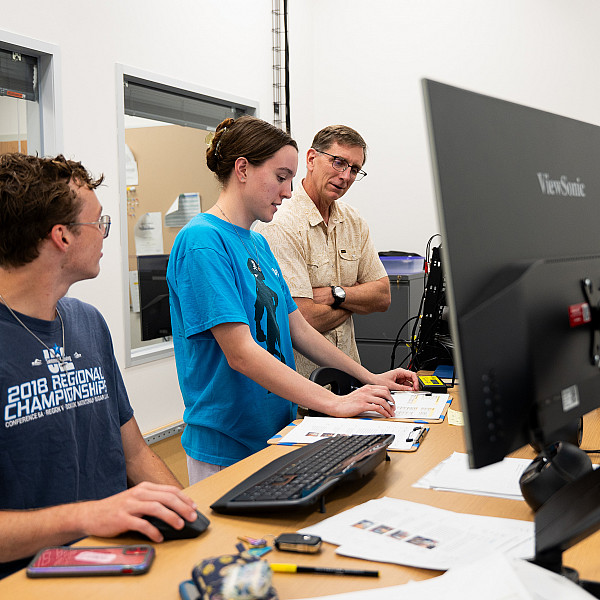News
Upcoming Summer Research Project to Explore Social and Political Heritage of the African Food Landscape in Texas
Assistant Professor of History Bryan Kauma’s Southwestern Undergraduate Research with Faculty (SURF) project, “Culinary Economics,” aims to understand the deeper story behind the African food scene in Texas.
February 20, 2025
February 20, 2025
Open gallery

This summer, Assistant Professor of History Bryan Kauma and two student researchers will embark upon a journey to better understand Central Texas’ growing African food landscape. The project, “Culinary Economics: Exploring the social and political heritage of African immigrant foodways in Texas,” was chosen as part of the inaugural summer session of the new Southwestern Undergraduate Research with Faculty (SURF) program.
The idea behind the Culinary Economics project was born out of some very real life experiences for Kauma, who recently immigrated to the United States from his home of Zimbabwe, after spending a few years living in South Africa and the United Kingdom. The UK is home to a diverse African population, including a growing Zimbabwean community. Living in the UK, Kauma discovered that he could easily find foods and products from his home country in numerous stores.
“You never really felt out of place,” Kauma said. “When you miss home, you can go to a store and get stuff that looks familiar, in the local brands that you know.”
After moving to Central Texas and beginning his Southwestern teaching career, Kauma quickly discovered that the food landscape in the United States is quite different than in the United Kingdom. While African food is available locally, he found that most stores over-generalize the category or classify all African food together, discarding the diversity of the continent’s many culinary offerings.
“The idea for this project really came from the challenges of trying to locate food that I actually know and identify with,” Kauma said. “Most of the African shops that I have met around here have offered me a substitute for something, which in many cases, wound up being my first time actually eating it. There was no social or emotional attachment.”
Along with his student researchers, Kauma hopes to explore – and then quantify – the deeper story behind the African food landscape in Texas. As the African population, and the popularity of African food, continues to grow across the state, the group will study a wide range of topics, ranging from how supermarkets are able to provide fresh African food in the face of increasing importation and exportation limits and quantity restrictions, to how African businesses, African business-owners, and Africans in general have integrated in Texas.
“I want to give my students an appreciation of the politics around food, then an appreciation for diverse cultures.” – Assistant Professor of History Bryan Kauma
The Culinary Economics SURF project is an extension of Kauma’s special topics course, “Edible Identities: Food in World History.” In the course, students dive into the ideas of culture, economics, and politics through the lens of food. The course covers the history of food production, as well as the flavors, tastes, preservations, and landscapes around different food cultures, while touching on issues of race, colonialism, climate change, sustainability, and even romance.
“It’s quite an interesting subject, at least for me, because I use food as a lens to understand society and to answer questions big and small,” Kauma said. “Why has the world associated strawberries with romance? Why is chocolate the gift for Valentine’s Day? Why do we have turkey for Thanksgiving? Why do people have cake on their birthday?”
In the course, Kauma spends time dissecting how media and popular culture in the United States and around the world often portray Africa as a starving continent, when in fact, Africa is home to many different and diverse food cultures.
“I want to give my students an appreciation of the politics around food, then an appreciation for diverse cultures,” Kauma said. “I want them to think about African food as something that’s edible, something that’s delicious, and something that matters.”
An avid cook himself, Kauma finds joy in sharing his passion with students, especially when concepts or topics that can be difficult to understand or verbalize, are viewed through the often uniting power of sharing a meal.
“I don’t feel the stress of work,” he said. “It’s always a pleasure to sit down and read a book and study it. You don’t see the hard work in it, and that’s enjoyable. When something is difficult and I don’t understand it, I can surf around the internet for it and not feel the labor of it.”
This quality paid dividends when it came to submitting his project proposal for consideration in the SURF program. The highly competitive application process allowed Kauma to think deeply about the research he aims to conduct and the outcomes he hopes will emerge. In addition to studying food and culture, the project will expose the student researchers to hands-on experience handling material, connecting with primary sources, and presenting information. Kauma plans to start his research in the greater Austin metropolitan area this summer then hopes to expand the scope to a broader area of Texas in the future.
“I want this project to help increase people’s knowledge of what food landscapes look like, and also to understand the politics around food,” he said. “When you understand the story behind the farmer, your appreciation of steak becomes different. When you understand there’s a whole labor involved and a market behind it, you have more context to understand it differently.”
Launched in the fall of 2024, the SURF program reimagines student-faculty collaborations on research and creative work at Southwestern. A combination of the previous Summer Collaborative Opportunities and Experiences (SCOPE) and Faculty-Student Projects (FSP) programs, SURF allows students the opportunity to partner with faculty from across disciplines to engage in scholarly and creative inquiry.
This winter, students applied to participate in nearly two dozen SURF projects that span across 12 academic departments. In March, about 50 students will be selected to participate in SURF projects, with the majority of research set to begin this summer. More information about the SURF program can be found at southwestern.edu/undergraduate-research/surf.

















